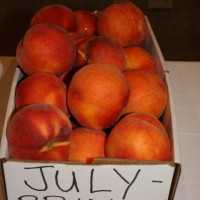A Peachy Day

In South Carolina, they certainly know their peaches. Perhaps nowhere is this more evident than at Clemson University’s Musser Fruit Research Farm, where for the past 11 years, a cultivar evaluation program has reviewed hundreds of stone fruit varieties, in search of those best suited for commercial production. More than 350 cultivars have been studied, both in university trials and in grower test blocks.
At the center of these efforts is Dr. Desmond Layne, a “Johnny Peach-seed,” if you will. When he’s not writing a “Stone Fruit” column for this publication, Layne acts as an associate professor of pomology and tree fruit specialist at Clemson. His latest passion, however, has taken him out of the classroom and away from the computer (for the most part; see the “Everything About Peaches” sidebar) and into the orchard, where Layne and his team spend hours evaluating potential cultivars based on Brix, shape, appearance, and perhaps most important, taste.
As Layne will attest, the greatest joy in his work comes when he finds that piece of fruit with the perfect combination of flavor, sugar, and juiciness. It’s hard to keep this experience to yourself, which is why Layne and his team now host an annual Peach Field Day at Clemson. This year’s event, which took place July 21, was an opportunity for growers across South Carolina and other southern peach-producing states, along with other guests, to learn more about the university’s breeding and germplasm evaluation program. The highlight of the day, however, was a tasting opportunity, where attendees could sample more than 40 selections, and make their own evaluations.
Breeding Success
Clemson’s Peach Germplasm Evaluation Program includes reviews of more than 350 cultivars at the Musser Research Farm, as well as three replicated trial sites on farms in major commercial production areas. The goals of the program are to evaluate long-term performance over multiple sites; work in cooperation with breeders and nurseries; make comparisons based on industry standards; keep everything updated in an online database; and either release cultivars or make recommendations for commercial production. The fruit is evaluated for at least five seasons before any recommendations are made. Germplasm evaluation orchards (either at the university farm or on commercial grower farms) are planted in high-density, perpendicular V blocks.
Varieties are evaluated based on criteria such as taste, visual details (size, shape), Brix, and soluble solids, as well as potential abnormalities. The cultivar mix includes normal- and low-acid fruit, and both yellow and white flesh varieties of peaches and nectarines. Donut, or “peento,” peaches are also in the mix. Many varieties originally came from the breeding program at USDA’s Byron, GA, facility, while others are from public and private breeders and licensed commercial nurseries.
Best Of The Best
The most recent peach and nectarine evaluations came from the Musser Research Farm as well as Cooley Peach Farms in Chesnee, SC. Full details on each variety can be found here.
So what stood out? Here’s a roundup of just a few cultivars that Layne says look promising (although note that they may have issues such as uneven splitting and rot tolerance).
– Flavorich: very good early peach, good quality, decent size and taste, strong acid, produces a full crop
– Honeyblaze: a good sub-acid, sweet and crunchy yellowflesh nectarine
– Sweet Dream/Sweet Blaze: These solid, low-acid varieties out of California have a nice sweet taste
– Winblo: This mellow, sweet variety is a personal favorite of Layne’s, thanks to its delicious taste and creamy flesh
– Julyprince: Notable for its good blend of sugar and acid
– Sugar Giant: This is a white, sub-acid variety with good size and a sweet taste
– Early Augustprince: This has nice flesh, good taste, and a good sugar/acid blend.
All these varieties are already available in the commercial trade, while other advanced selections could be available soon. In the meantime, Layne and his team will continue to spend time in the orchard, seeking out what Layne calls “the perfect peach.”










